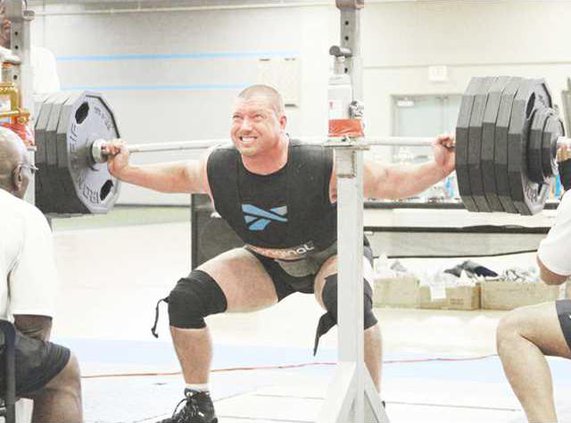Fitness enthusiasts tested their strength during “The Rock,” a powerlift and bench-press competition Saturday at the 4th Brigade Combat Team fitness center on Fort Stewart.
Soldiers, families and community members competed against each other in three powerlift categories: squat, bench press and the deadlift.
“A lot of people are out here for their very first time,” said retired 1st Sgt. Jake Battle, 4th BCT facility manager. “It is something fun and new to add to their fitness routine.”
Each competitor was allowed three lifts or bench-pressing attempts in each category. The lifter’s best attempt counted toward his or her competition total. Competitors were judged against other lifters of the same gender and weight class. Two women competed in different weight classes, while 15 men competed in multiple weight classes from 130 pounds to 265 pounds.
“This competition is mostly about muscle power,” Battle said. “These competitors train for power and strength.”
The tournament started with weigh-ins followed by the squat category, which began with the lightest woman and finishing with heaviest man. During the squat category, lifters loaded weights on their shoulders and dropped into a squatting position far enough to have their hips parallel with the floor. They then returned to a standing position. A judge decided whether the squat was good.
“We are looking for proper form,” Newman Fitness Center program manager Devin Bradley said. “They also have to squat down far enough to make the squat count and then come up without dropping the weights or falling.”
The competitors were judged using the United States Powerlifting Federation rules and regulations.
Each competitor determined how much weight he or she would lift at the beginning of the event. Weight was added to the bar before competitors’ attempts in all three categories, starting from lowest to highest. Along with competing against other lifters, participants set weight goals for themselves to beat.
“I want to lift 565 pounds,” said competitor Daniel Kessler from Rincon. “That will be my third attempt … I think I can do it.”
Kessler enjoys working out in the gym, but hadn’t competed in a powerlift tournament for years.
“This is my first competition in a long time, so I just kind of want to see where I am and how far I can push myself,” he said. “I really want to get back into it.”
Kessler completed his goal, squatting with the most weight in the competition that day. Like many competitors, Kessler used a belt to support his back.
“Your back can only hold so much,” he explained. “You can really strain your back if you don’t use a belt.”
Kessler trained three to four days a week for three months to prepare for the competition. The physical benefits motivated him to get back into powerlifting.
“Competing and working out really increases my confidence,” he said. “And I have a lot more pride in myself.”
Powerlifters practice weight training to improve performance in the three categories. Most competitors, Battle said, focus on decreasing the number of repetitions and adding heavier weights when training.
“Basically, if you want to increase lean muscle tissue, you need to do some type of resistance training,” Battle said. “Muscle endurance is more important than cardio when training for a powerlifting competition.”
Competitor Nikita Thomas trained this way for the competition. She broke the squatting record in her weight class during her second attempt. She then broke her own record on her third attempt.
“I competed in a powerlifting competition last April but didn’t break any records, so I am really happy that I am improving,” she said.
Thomas, a military spouse, works at the gym. She broke her first record, lifting 145 pounds, and then lifted 155 pounds in her third attempt.
“I love working out and not only am I skinny, but I actually look fit now,” she said. “It is a great competition.”
Lifting contest assess strength, fitness
Two women, 15 men enter on-post meet


Sign up for our e-newsletters